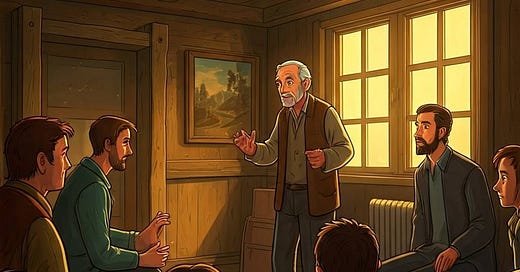How you tell yourself the story makes a difference!
We turn every event into a story. Those stories make us who we are. Be careful how you tell yourself the story because you are building your future and your legacy.
How you tell yourself, the story of what happened makes all the difference in the world. The point is that you must decide how to see each occurrence of anything in your life. How you tell the story will be how you see God and the place of God’s Word in your life.
Your identity emerges from the stories you decide to tell yourself about each event in your life. We frame our experiences as victories, defeats, blessings, or curses. Our framing of the story shapes our understanding of the past, our approach to the future, and our very sense of self.
When something significant happens, we stand at a story crossroads. Will we see ourselves as victims, dwelling on what others did to us and how unfair it was, or see this event as a growth opportunity?
Those who decide to think like victims might find temporary comfort in sympathy and understanding from others. However, this perspective can become a self-fulfilling prophecy, leading to learned helplessness. In contrast, those who frame their stories through a lens of strength and growth—even in the face of genuine hardship—often discover strength they didn’t know they possessed.
It would be best to weave your stories into a greater meaning. How will God reveal Himself more to me in this moment, tragedy, or difficulty? How can I grow in and through this? Connect your stories to something or someone more significant than yourself.
Even the most painful experience can be a stepping stone to something greater. We can grow, find a better job, grow closer to God, improve our health, appreciate life, or develop stronger connections with our family.
Do we decide to allow a single event, especially a traumatic or challenging one, to define our lives? Are these events part of our life story or a chapter in a longer story?
Focusing and fixating on one moment will leave you trapped in time, reliving and reacting to the past. This focus limits every other aspect of your life and limits your future possibilities. However, we can take the difficulties and grow forward.
We never want to enter into denial or some weird positive thinking. We simply find ways to understand our experiences. What might be a catastrophic failure today may lead to your greatest discovery.
Some stories need to be held very lightly. Allow them to grow as you learn new perspectives and insights. We cannot change reality, but our perspective on it can change.
Our stories are powerful tools for meaning-making and identity formation. We can seek greater meaning by thinking through our stories and choosing growth over victimhood. We can turn our stories into stepping stones of our experience, guiding us into the future.
We don’t avoid difficult chapters or act like they never happened; we choose to read, interpret, and integrate them into our larger life story. In this way, we become not just the actors in our stories but their conscious authors, capable of writing new meanings and possibilities into even the most challenging experiences.
How will you tell the story?
I think of Jesus and how He tells the story of His death. It was horrific, but He set His face like a flint to go and die. He looked beyond His suffering to the joy set before Him. He found great joy and victory through His most horrible moment.
How did the early Christians view the horrible persecution? What story did they tell? Driven by faith, they rushed to meet other Christians, praising and glorifying God for deeming them worthy of suffering, not to hide and cry.
Can you see that how you look at the event will determine how you tell the story? How you tell the story will determine how you view yourself. Change the way you look at the story. Look for the God-glorifying moment in the story instead of focusing on how terribly you were treated.





